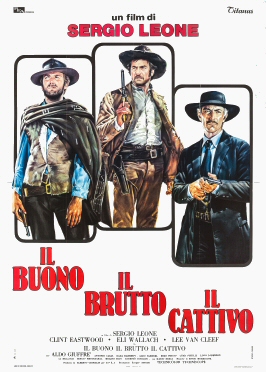
The Good, the Bad and the Ugly
The Good, the Bad and the Ugly (Italian: Il buono, il brutto, il cattivo, literally "The good, the ugly, the bad") is a 1966 Italian epic spaghetti Western film directed by Sergio Leone and starring Clint Eastwood as "the Good", Lee Van Cleef as "the Bad", and Eli Wallach as "the Ugly". Its screenplay was written by Age & Scarpelli, Luciano Vincenzoni, and Leone (with additional screenplay material and dialogue provided by an uncredited Sergio Donati), based on a story by Vincenzoni and Leone. Director of photography Tonino Delli Colli was responsible for the film's sweeping widescreen cinematography, and Ennio Morricone composed the film's score, including its main theme. It was an Italian-led production with co-producers in Spain, West Germany, and the United States. Most of the filming took place in Spain. The film is known for Leone's use of long shots and close-up cinematography, as well as his distinctive use of violence, tension, and highly stylised gunfights. The plot revolves around three gunslingers competing to find a fortune in a buried cache of Confederate gold amid the violent chaos of the American Civil War (specifically the Battle of Glorieta Pass of the New Mexico Campaign in 1862) while participating in many battles, confrontations, and duels along the way. The film was the third collaboration between Leone and Clint Eastwood, and the second with Lee Van Cleef. The Good, the Bad and the Ugly was marketed as the third and final installment in the Dollars Trilogy, following A Fistful of Dollars and For a Few Dollars More. The film was a financial success, grossing over $38 million at the worldwide box office, and is credited with having catapulted Eastwood into stardom. Due to general disapproval of the spaghetti Western genre at the time, critical reception of the film following its release was mixed, but it gained critical acclaim in later years, becoming known as the "definitive spaghetti Western".
